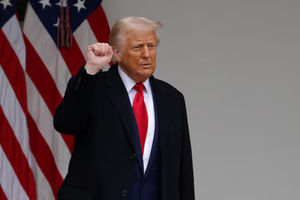Belarus leader who helped dissolve USSR dies at 87

Stanislav Shushkevich died of complications from coronavirus. PHOTO | FILE
What you need to know:
- Shushkevich, who later became a critic of Belarus's strongman leader Alexander Lukashenko, died of complications from coronavirus
- Shushkevich led Belarus from independence until he was defeated in a 1994 election by Lukashenko, becoming a prominent member of the opposition
The first head of state of an independent Belarus, Stanislav Shushkevich, who with the leaders of Russia and Ukraine signed a decree dissolving the Soviet Union, has died aged 87, his wife told AFP.
Shushkevich, who later became a critic of Belarus's strongman leader Alexander Lukashenko, died of complications from coronavirus, his wife Irina said Wednesday.
As chairman of the Belarus Supreme Soviet, Shushkevich, along with Russian leader Boris Yeltsin and Ukrainian leader Leonid Kravchuk, signed the 1991 declaration that dissolved the Soviet Union.
Shushkevich led Belarus from independence until he was defeated in a 1994 election by Lukashenko, becoming a prominent member of the opposition.
"We hope that a state funeral will be organised, but no one has contacted us yet" Irina Shushkevich said.
The Belavezha Accords, signed on December 8, 1991 at a luxury dacha in the Belovezhskaya Pushcha forest in Belarus, set up the post-Soviet group the Commonwealth of Independent States (CIS) to replace the Soviet Union.
The three leaders were reported to have fired off guns and downed glasses of vodka at the hunting lodge before signing the historic document.
Born in Minsk, Shushkevich took over the Supreme Soviet after the previous chairman was ousted because of his support for a Communist hard-line coup attempt in August 1991 against Mikhail Gorbachev.
After Belarus's independence, he remained head of state until 1994, although he never formally held the title of president.
He was ousted in a graft probe spearheaded by Lukashenko, who at the time headed the Belarus anti-corruption committee.
'Big loss'
In June 1994, Shushkevich stood in presidential elections against Lukashenko and other candidates but was knocked out in the first round.
Lukashenko won a landslide victory in the second round and has remained president ever since.
Shushkevich subsequently became a leading critic of Lukashenko and strong supporter of the country's liberal opposition.
In 2012 Lukashenko accused Shushkevich of leading a "fifth column" in Belarus and the ex-leader was barred from leaving the country.
A year later, while writing his memoirs, Shushkevich said he had tried to access the original signed declaration from Belavezha but it appeared to have been lost.
Shushkevich had been less active in recent years and played no role in the huge anti-government protests that erupted after Lukashenko claimed another victory in an August 2020 presidential election.
Tens of thousands took the streets for weeks and thousands were arrested in a severe crackdown that crushed the demonstrations and saw many opposition leaders flee the country.
Svetlana Tikhanovskaya, the Belarusian opposition leader who now lives in exile, called Shushkevich's death "a big loss for the Belarusian people and the democratic world."
"The first leader of independent Belarus will be remembered for his role in the dissolution of the Soviet Union. May he rest in peace," she said on Twitter.
Belarusian media reported in April that Shushkevich was in intensive care due to complications from the coronavirus.
There was no immediate reaction from officials in Minsk on Wednesday to his death





